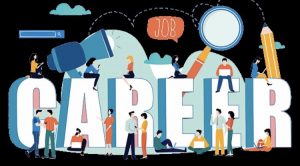CAREERS DEPARTMENT

Members of the Department
Mr J. Wilson-Head of Careers – jwilson602@c2kni.net
Miss E. McCarron
Mrs M. McElroy
Mrs J.Young
Introduction
Careers Education, Information, Advice and Guidance (CEIAG) is delivered throughout all key stages and students benefit from expert guidance through the services of specialist staff. Teachers in the department adopt a pupil-centred approach, which aims to equip students with the skills and capabilities necessary to make informed decisions in key transition years.
Work-related learning and the development of Employability Skills are composite elements of the CEIAG Learning Offer. As such, students undertake relevant work experience in Years 12, 13 & 14; this provision affords young people the opportunity to view their current course of academic study in relation to the world of work and their long-term career aspirations.
Timetable Provision
| Years 8,9 &10 | Education for Employability (LLW) – One 35 minute Period per week. |
| Years 11 &12 | Careers: One 35-minute period per week, organised into six groups according to Form Class. |
| Year 13&14 | Careers: One 35-minute period per week, organised into groups according to AS/A2 Subject Choice. |
Careers Guidance
In Year 12 students receive specialist advice by way of Careers Guidance Interviews (CGI) conducted by staff from the NI Careers Service. This arrangement is an integral part of the annual Partnership Agreement, which outlines the suite of services on offer to the Careers Department.
Students at other key transition points can also request a CGI with Mr. Wilson, who fully endorses the department’s ‘Open Door’ policy.
In Years 13 & 14 all students are offered careers guidance at a much more intensive level. In Year 14 the focus is very much on the completion of applications for Higher Education courses i.e. UCAS, CAO, St. Mary’s College, Belfast and regional colleges of Further Education.
Post-16 students are also offered extensive Interview preparation and receive assistance when preparing to undertake third level entrance examinations and when completing applications for Higher Level Apprenticeships and Degree Apprenticeships – see link below for further details:
https://www.nidirect.gov.uk/campaigns/apprenticeships
Learning for Life and Work (LLW)
The Employability strand of LLW is timetabled as a discrete subject in Years 8 – 10 (Key Stage 3) and is delivered by a team of experienced teachers. Key concepts within this strand include:
- Work in the Local and Global Economy.
- Career Management; and
- Enterprise and Entrepreneurship.
In Years 11 – 12 (Key Stage 4 – GCSE) the Statements of Minimum Requirement for LLW are integrated in timetabled Careers classes and provide students with the opportunity to:
- explore self employment and identify relevant sources of support.
- examine the impact of globalisation on employment.
- investigate the recruitment and selection process, considering the rights and responsibilities of employees and employers.
- consider how employees and employers might maintain an effective working environment.
- investigate the increasing social responsibility of business in the community.
- develop a personal career plan based on relevant information and guidance.

STEM – Science, Technology, Engineering & Mathematics
Why is STEM important? Technological developments and advances in ICT have made possible the idea of a ‘global economy’; thanks to improved infrastructures and super-fast transportation networks, the world has become a small, easily navigated marketplace. The Internet revolution means goods can be bought and sold all round the world with a few clicks of a mouse; business deals can be agreed via video-conference links and vital business documents can be transferred and exchanged instantly.
In a fast paced, dynamic business environment, employers need a workforce of problem-solvers, innovators, and inventors, who are self-reliant and able to think logically. STEM subjects infuse these attributes in young people and prepare them for the lifelong learning and the world of work. Excellence in STEM disciplines also enhances a country’s capacity to be innovative and technologically creative, thereby strengthening the ability to create employment and attract foreign direct investment.
What subjects are STEM related? The core STEM subjects are Science, Biology, Chemistry, Physics, Technology and Mathematics. Other subjects in the curriculum contribute to the STEM Agenda, such as Nutrition & Food Science and Digital Technology.
Graduates in STEM subjects are vital for the UK’s future economic prosperity; due to the gender imbalance and skills shortages that exist in many STEM employment areas, vast opportunities exist for women to join companies, who are leading the global innovation race against powerful countries such as China, the USA and India.
Recent economic thinking has highlighted the need for Creativity in STEM development; subsequently there is a general acceptance among business and government leaders that greater convergence is needed between STEM and Arts based subjects e.g. Art & Design, English, Music, History & Modern Languages, to nurture creative thinking in future generations, hence the move from STEM to STEAM.



Useful Websites
Ulster University www.ulster.ac.uk
Queen’s University Belfast www.qub.ac.uk
CAO www.cao.ie
UCAS www.ucas.com
Belfast Met www.belfastmet.ac.uk
St Mary’s College Belfast www.stmarys-belfast.ac.uk
Stranmillis College Belfast www.stran.ac.uk
Student Finance NI www.studentfinanceni.co.uk
NI Careers Service www.nidirect.gov.uk/careers
Career Pilot www.careerpilot.org.uk
NHS Careers www.healthcareers.nhs.uk